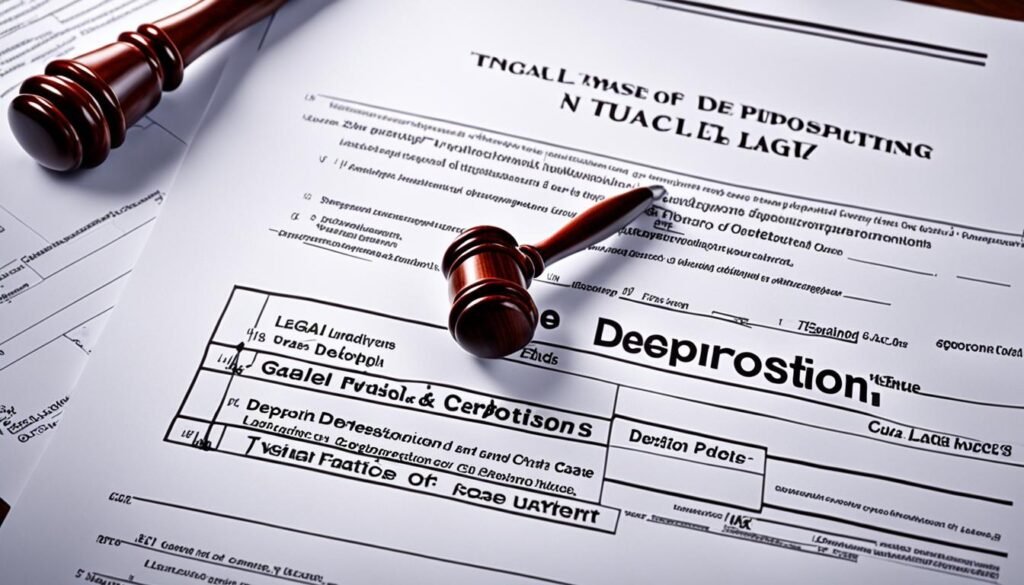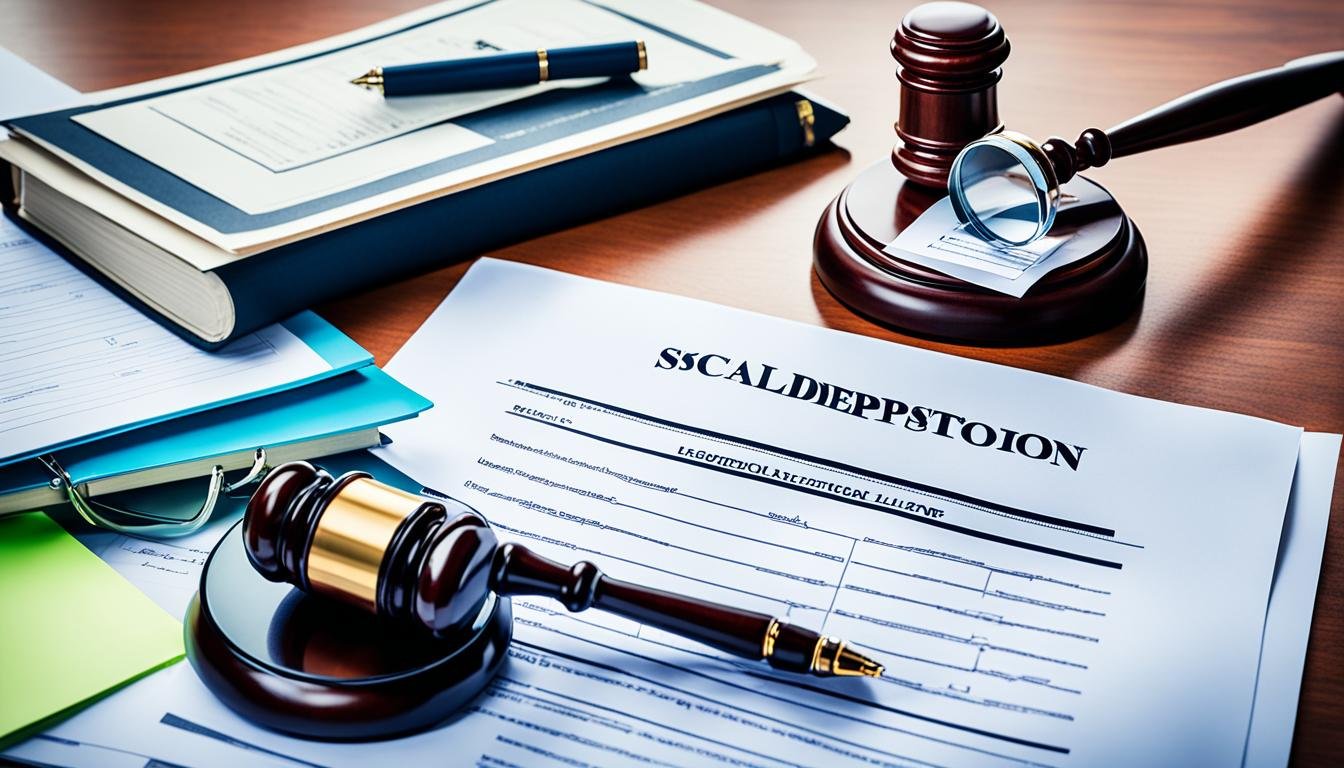Depositions play a huge role in the U.S. legal system. In fact, they are part of more than 90% of civil cases. Knowing how to handle them can really affect your case’s result. We’ve put together seven key tips to make your deposition go smoothly. These suggestions work for both witnesses and lawyers, aiming to build a strong deposition approach.
Key Takeaways:
- Thorough preparation is key to a successful deposition.
- Think before speaking to ensure clear and accurate responses.
- Be concise and stick to the specific question being asked.
- Maintain composure and remain calm throughout the process.
- Follow your attorney’s guidance for the best possible outcome.
Understand the Purpose of a Deposition
Understanding what a deposition is for is key before you start. It’s a pre-trial tool for finding facts from witnesses. This helps both sides learn about the case, its strengths, and weaknesses. Knowing why depositions happen helps to focus on getting the right info for your case.

During a deposition, lawyers can ask witnesses questions while they’re under oath. This makes sure all details are recorded. These details are crucial for the trial. They help lawyers decide if a witness is reliable.
Depositions also let each side share information and understand the other’s case better. By asking different questions, lawyers may find new facts. They see where their case is weak and plan to make it stronger.
Depositions help attorneys prepare for trial by acquiring firsthand knowledge of witnesses’ testimonies, uncovering new evidence, and refining their legal strategies.
Lawyers can figure out if witnesses seem truthful during a deposition. They also see where their case is strong or weak. Plus, they get a heads-up on what the other side might argue. So, understanding a deposition’s purpose is vital for good strategy and tips.
Now you know why depositions matter, let’s look at how to prepare for one in the next section.
Thoroughly Prepare for the Deposition
Getting ready is crucial for a successful deposition. Start by reviewing all relevant documents and evidence related to the case. This includes prior statements, police reports, and medical records. It’s important to know the facts and details of the case well to avoid mistakes in your testimony.
Talk to your lawyer about any weak spots or sensitive issues. Working together, you can plan how to deal with these during the deposition. Your lawyer’s advice is key to spotting problems early and answering confidently.
Practice makes perfect, so practice answering potential questions to boost your confidence. You might even do mock depositions with your lawyer’s help. This way, you can get used to the kinds of questions you might face.
By preparing thoroughly, you’ll be more ready to give clear and straightforward answers at the deposition.
Think Before Speaking
During a deposition, being careful with your words is key. Always think before you answer a question. This helps you give clear, correct answers and avoid mistakes. Remember, you’re there to answer truthfully, not to guess.
Using expert deposition tips can make a big difference. Think about the question first, then answer. This way, your responses will be on point and help your side.
Good legal advice says to think before you talk in a deposition. Doing this makes you seem more reliable and in charge. It shows you’re a pro even under stress.
A deposition can be tough. But if you pause to think before speaking, you’ll do better. This approach helps you stay accurate and back up your case well.

Be Concise and Stick to the Question
Answering deposition questions effectively means being concise and to the point. Don’t go off topic or share unnecessary info. This could hurt your case. Stick to what’s asked to avoid giving the other lawyer something to use against you.
Your aim during a deposition is to share truthful, relevant information. Don’t get lost in details or long explanations. Short answers help you control what you share, reducing chances for misunderstanding.
Being concise also saves time in a deposition. This way, you can spend more time on the important parts of your case. It helps make your position stronger.
“I’m sorry, could you rephrase the question?” – John Doe, Deposition Witness
Make sure to highlight important points clearly but keep your answers simple. Use facts and clear language. This makes sure your message is understood well and there’s no confusion.
| Effective Deposition Strategies | Deposition Tips for Attorneys |
|---|---|
| Be concise and stick to the question | Thoroughly prepare for the deposition |
| Think before speaking | Remain calm and composed |
| Follow your attorney’s guidance |
By taking this approach, you’ll come across as trustworthy and prepared during a deposition. Remember, a deposition is your chance to give useful information and support your side. Stick to the point and be concise for a strong deposition.
Remain Calm and Composed
A deposition can be stressful. Yet, it’s key to stay calm throughout it. Focus on what’s happening and don’t get upset by hard questions. Your lawyer will help and step in when needed to keep your rights safe. This calm behavior helps show your best side and keeps you credible.
It’s normal to want to react when questions get tough. But, keeping your cool is vital. Being calm lets you think clearly and answer well, helping your case.
The other lawyer might try to upset you to get harmful answers. Staying calm stops you from falling into these traps. This control is important for your testimony.
Your lawyer is there to help. They’ll guide you and tell you how to deal with hard questions. They’ll also protect your rights when needed. Trust their advice during the deposition.
Keeping calm helps you focus on giving true and clear answers. When we’re emotional, it’s easy to forget this goal. But, staying composed ensures your answers are on point.
“During depositions, keep your emotions under control. Emotional answers can turn against you, so stay calm and objective.”
– John Smith, Attorney-at-Law
Being calm shows you in a good light and keeps your trustworthiness. It shows you’re professional and believe in what you say. Staying calm marks you as a reliable witness.
To sum up, staying calm in a deposition matters a lot. Trust your lawyer, keep focused, and don’t let emotions get the better of you. With calm, you face the deposition with confidence and a better chance for success.
Follow Your Attorney’s Guidance
Your attorney is key when facing a deposition. They know best practices well. Following their advice boosts your chances for success.
They’ll prepare you by developing strategies and anticipating challenges. You’ll learn how to answer questions effectively. Together, you’ll review your case, focusing on any weaknesses.
On the big day, your attorney will support you every step. They ensure you understand questions before answering. This helps you give clear and relevant answers.
“Your attorney’s expertise in depositions is crucial. Trust their knowledge and support through tough questions and situations.”
Having a skilled attorney means you’re not alone. They fight for you, aiming for success. Their knowledge is a huge help in navigating your deposition and winning your case.
Expert Guidance at businesslawyersirvine.com
Looking for top-notch attorneys for depositions? Check out businesslawyersirvine.com. It’s where you find lawyers well-versed in deposition strategies.
Go to businesslawyersirvine.com or call 949-996-9546 for expert help. The right attorney can make a huge difference. They’ll prepare you well and boost your confidence, helping you get the best result for your case.
| Benefits of Following Your Attorney’s Guidance |
|---|
| Access to expert legal advice and support |
| Assistance in strategizing and preparing for the deposition |
| Guidance on providing concise and relevant responses |
| Protection of your rights and interests |
| Increased chances of achieving a successful outcome |
Conclusion
Being successful in a deposition involves being well-prepared and clear-minded. You must answer questions concisely and stay calm. To do better, review all important documents and know your case facts well. Before answering, think carefully and only respond to the question asked. Stay composed and follow your lawyer’s advice.
Success in depositions comes from good preparation and smart actions. Use these tips to be confident and give correct information in your deposition. Trust your lawyer and get help from the best ones around. For top legal help and to find Super Attorneys, visit businesslawyersirvine.com or call 949-996-9546 now.

